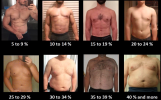Depending on where you are right now that can be a very unrealistic goal and you need to be aware of it.
You also need to go on a caloric deficit, with a diet made by someone who is a doctor in nutrition and who can run some tests on you before that. You want a diet which you'll be able to hold it for a long time, not just a month or two, unless you prepare for some show.
Usually the quicker you lose weight the quicker you gain it back. If you suffer a dramatic weight loss of more than 1-2lbs per week, you are very likely to bounce back and gain even more weight.
Genetics play in important role in the way we look, as we all store fat differently.
Fasted cardio might not work due to the fact that you might feel even hungrier than training after a meal and you will end up eating way more calories than you should.
You can train as hard as you want and do all the type of abs that you want, if not paired with proper nutrition you will end up getting stronger and more endurance but not necessarily a visible 6 pack.
I get all my information from Greg Doucette by the way, as I am not a qualified nutritionist, and I find his information very valuable.
Anyway as I mentioned I am not a qualified doctor so feel free to disregard all that I have said.
You also need to go on a caloric deficit, with a diet made by someone who is a doctor in nutrition and who can run some tests on you before that. You want a diet which you'll be able to hold it for a long time, not just a month or two, unless you prepare for some show.
Usually the quicker you lose weight the quicker you gain it back. If you suffer a dramatic weight loss of more than 1-2lbs per week, you are very likely to bounce back and gain even more weight.
Genetics play in important role in the way we look, as we all store fat differently.
Fasted cardio might not work due to the fact that you might feel even hungrier than training after a meal and you will end up eating way more calories than you should.
You can train as hard as you want and do all the type of abs that you want, if not paired with proper nutrition you will end up getting stronger and more endurance but not necessarily a visible 6 pack.
I get all my information from Greg Doucette by the way, as I am not a qualified nutritionist, and I find his information very valuable.
Anyway as I mentioned I am not a qualified doctor so feel free to disregard all that I have said.

